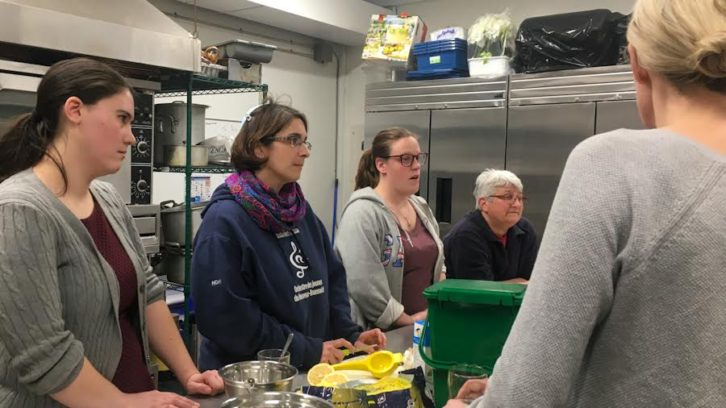Halifax synagogue holds first of four public kosher cooking classes
The food industry has seen a surge in kosher food, and this new cooking series explores what keeping kosher is really like

caption
Eggplant, steaming hot from the oven.A Halifax synagogue wants locals to come out to taste some Jewish cuisine at their first ever kosher cooking class.
The Shaar Shalom Synagogue on Oxford Street recently launched a four-week kosher cooking class series with two goals in mind: educating locals — Jewish or otherwise — on what it means to keep kosher under Jewish dietary law, and debunking misconceptions about kosher eating.
The food industry has seen a surge in the kosher food department, with more than $150 billion dollars in kosher products being consumed globally each year. To some, kosher food is perceived as being more healthy, pure, and even safer than most foods.
But do people buying kosher know what it means?
“Kosher slaughter is designed to be painless,” said Rabbi Gary Karlin, host of the cooking series.
Kosher food is food that does not have any non-kosher ingredients in accordance with Jewish law. What makes something kosher is that meat and milk products are not mixed together, and animal products from non-kosher animals (like pork and shellfish) are not included.
“Kashrut is really a catch-all for many dietary laws scattered throughout the Torah,” said Karlin during the class.
The laws of kashrut, also referred to as the Jewish dietary laws, are the basis for the kosher observance. These rules were set forth in the Torah and elaborated on in the Talmud, the source from which the code of Jewish Halakhah (law) is derived.
The Hebrew word “kosher” means “fit,” and the kosher laws concern themselves with which foods are considered fit to eat.
Keep it kosher
With the kosher symbol becoming a bigger and bigger marketing device, Rabbi Karlin wants to reminds people that keeping kosher is more than a symbol you see at the grocery store.
He noted it’s an important part of Jewish culture and identity.
“When people find out the way I keep kosher involves all sorts of compromises, and they say, ‘How can you live that way?’” he said.
“For me, having done it like this for decades, it doesn’t feel onerous. It becomes part of who I am and part of my expression as who I am as a Jew.”
Rabbi Karlin also stresses that keeping kosher is a personal and intimate lifestyle and religious choice, and not all Jewish people keep kosher.
Congregation member Inbal Bahar, who requested a class like this be hosted several months ago, said she’s curious about how to integrate her vegetarianism with being kosher.

caption
Up on the menu first: baba ghanoush.“I want to learn more and then make an informed decision on if I want to change anything and if I did, what would it look like,” said Bahar.
And class attendee Kerrie Wootton recently converted to Judaism and wanted to know more about the kosher lifestyle.
“Because I’m a convert, I love knowing the meaning behind things because I didn’t grow up with it,” said Wootton.
Karlin also notes the cooking class is an opportunity to better understand how to respect people and places that are kosher.
“We are a kosher institution. So I want people to a) understand what that means, and b) understand how to do it, and c) why in fact this is a good thing,” said Karlin.
Future classes will be held on Feb. 2, 9 and 23. The final class will end with a trip to the supermarket, where Karlin will teach attendees how to identify and select kosher food.
“The goal is to expose people to not only the basis of kashrut, given all the misconceptions out there, but also a consistent manner of observance,” said Karlin.
“People kind of observe dribs and drabs of their religious traditions, so one of my goals is to look at this and say, ‘If you want to do it right, here’s how you do it.’”
About the author

Feleshia Chandler
Feleshia is a freelance journalist who has contributed to the Coast and Quench Magazine. She enjoys writing about feminist issues, LGBTQ issues...
